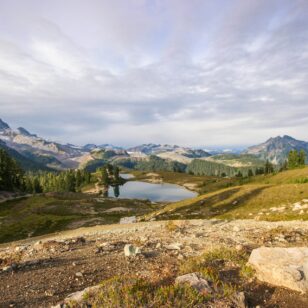
Grouse Grind, North Vancouver. Photo credit: Tourism BC
Outdoor activities like hiking, biking, and spending time in parks are one of the best ways to get exercise and have fun during the Covid-19 Pandemic. But there are a few things you should know before you go to ensure you stay safe and respect nature.
Plan Ahead and Bring Supplies
Just like before the pandemic, North Shore Rescue recommends bringing essential safety and first aid gear on every trip. Check the forecast and pack extra clothing for the weather. And leave a trip plan so someone knows where you are going and when you will be back.
During Covid-19 you should also pack some extra supplies. Public washrooms may run low on soap, hand sanitizer, and toilet paper, so bring your own just in case. In some areas, garbage pick-ups may be delayed or bins are at capacity, so bring a bag and take your trash home with you. Bring a mask or face-covering to wear inside washrooms or in places where physical distancing is difficult.
Practice Physical Distancing
Remember to stay six feet (two metres) apart. Walk, hike, or bike single file and move over to let others pass. Wear your mask when it is impossible to stay two metres apart, such as when passing on narrow trails.
Play it Safe
Choose lower risk activities to reduce the risk of injury and lessen the burden on search and rescue and health care workers.
Keep Your Group Small
Hiking in a group is great for safety, but during Covid-19, make sure you keep your group small. Between two and six people is ideal. That way you will leave more room for everyone to enjoy our parks and trails, and make passing other groups easier.
Check for Closures, Day-Pass Requirements and New Rules
With more people choosing to get outside during the pandemic, many of Vancouver’s parks and trails are busy. While most areas are open, some remain closed or have new rules like reduced capacity, one-way trails, or day-passes. These rules are in place because physical distancing may not be possible or the risk of environmental damage is high.
Where to Check for Closures and Rules
Check for rules and closures at the park or trail you want to visit before you go. In the Vancouver area, we have many different types of parks including BC Provincial Parks, Metro Vancouver Regional Parks, Fraser Valley Regional Parks, Recreation Sites and Trails, parks managed by BC Hydro, and local municipal parks such as City of Vancouver Parks, District of North Vancouver Parks, and Coquitlam Parks. Use these websites to check for rules and closures in the park you want to visit.
Reserve Day-Passes and Gondola Tickets Ahead of Time
Some local hikes will need a bit of advance planning: While some Vancouver area Provincial Parks required day passes during the summer, that program is not in place for the winter.
If you want to hike at Grouse Mountain, reserve your spot on the Grouse Mountain Skyride in advance.
Current Trail and Park Closures
The following Vancouver-area parks and trails remain closed. (This list was last updated on March 30, 2021.)
- Joffre Lakes Provincial Park, Pemberton
- Lynn Canyon Suspension Bridge, North Vancouver (The bridge is closed but surrounding trails are open.)
- Othello Tunnels at Coquihalla Canyon Provincial Park, Hope
- Peach Arch Provincial Park, Surrey
- Quarry Rock Trail, North Vancouver
Have a Back-Up Plan to Avoid Crowds
Many parks and trails are very busy and parking lots can fill fast. Come prepared with a back-up plan if you arrive and the place you want to visit is too busy. Consider visiting early in the morning or in the early evening to avoid crowds.
Leave No Trace
With more people getting outdoors during the pandemic, our parks, trails, and wilderness areas are feeling the strain. Learn about and follow the Seven Principles of Leave No Trace to reduce your impact and keep nature beautiful.
Be Bear Aware
We share the trails with many animals, including bears. In general, bears aren’t interested in people. However, bears may become defensive if they are protecting cubs or food, or if they are surprised. To reduce the risk of a negative bear encounter, carry bear spray, hike with a group, and use your voice to talk or sing to alert bears to your presence. Never leave food unattended or feed animals.
If you do see a bear, don’t run. Back away slowly while speaking to the bear softly and avoiding eye contact. If the bear comes within close range, use your bear spray and aim for their eyes. If you are attacked, fight back. Visit Bear Smart for more information on bear safety.
Have Fun
Studies show that spending outdoors can improve your mental health. Hiking, biking, walking, or just lounging in a park are a great way to connect with nature and boost your mood. And we could all use a little bit of that right now.
















